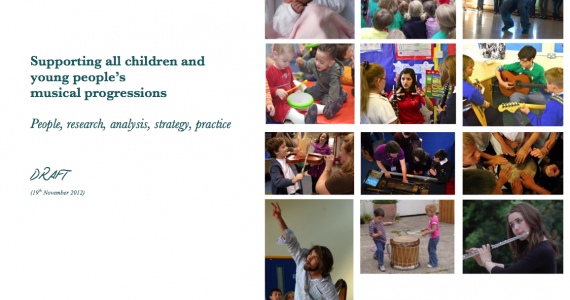Supporting all children's musical progression

The Musical Progressions Roundtable is a network of organisations, from right across the breadth of music education, looking at how we could work together to realise all children and young people's musical potential.
Over the past few months, this group, which I'm hosting with Awards for Young Musicians, has been working on how all of the partner organisations in a Hub might come together, working with children and young people and their parents/carers and others, to create environments in which all children's individual progression journeys could be supported.
Previous research around musical progression had highlighted the importance of considering the whole environment, rather than particularly well-trodden 'progression routes' through it. And then we'd identified what some of the ingredients in this environment should be.
So how could a collection of very different organisations (e.g. music and arts organisations, schools, music services, local venues etc.) and individuals (children and young people, parents/carers, independent music teachers and music leaders) make those environments a reality for all children?
A plan, or a strategy, for this goal, and with such a broad set of stakeholders, would have to be careful not to tell everyone what to do, but to identify a set of things that everyone could do in their own ways. And it would also need to find ways of harnessing as many available resources as possible, including the vital contribution that young people themselves, and their parents, can play in their music education.
For example, if teachers helped young people to understand the variety of different musical careers (performers, engineers, software designers, sound designers, teachers, facilitators etc.) and some of the different ways of measuring musical excellence (music exams, Arts awards, YouTube views, concert reviews, self-satisfaction etc.) then that would help young people to identify relevant role models and goal models for their own music-making, helping them to define their own musical journeys, and maintain their motivation. Or if parents impressed upon school headteachers the value of music-making for their children, that could lead to music being better valued, to better musical CPD for teachers and an environment where music teachers could develop confidence.
The skeleton strategy we developed (available as a pdf) aims to identify a set of core activities that the people in a Hub could take on, in a way that knits them all together - a harmonious strategy, if you like. We're not trying to tell anyone what to do, but just to show one generic set of ways in which you could do things.
We've also produced an A3 poster of this strategy, which attempts to map out these activities and to show the individual journeys between them.
We're currently working on producing some practical tools and materials for the different stakeholder groups (children and young people, parents, schools, teachers, music organisations, Hub lead organisations etc.). More to follow soon!
Please have a look through these materials and let us know what you think!








Add comment